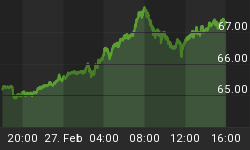On the Official Chinese government's website, China's foreign exchange regulator said one of its targets for 2006 was to "improve the operation and management of foreign exchange reserves and to actively explore more effective ways to utilize reserve assets. The objective is to improve the currency structure and asset structure of our foreign exchange reserves, and to continue to expand the investment area of reserves. We want to ensure that the use of foreign exchange reserves supports a national strategy, an open economy and the macro-economic adjustment."

The announcement came from the State Administration of Foreign Exchange (Safe). Will this mean a change in Chinese Gold & Foreign Exchange Reserves, now at nearly $800 Billion at the end of 2005 and expected to approach $1,000 Billion this year?
In our last article on this subject we described how the Yuan Revaluation was the beginnning of the process of moving away from the $ in the accumulation of Chinese reserves. Now this statement extends to the actual management of existing reserves, with the future growth of the country and its place in the global economy in mind.
With these reserves almost exclusively in the U.S. $, this statement signals a lowering of the U.S. $ content in the Reserves, as China cares for its specific needs.
- Gold
Will China include Gold in this policy ("We want to ensure that the use of foreign exchange reserves supports a national strategy, an open economy and the macro-economic adjustment")? We believe it will. We do not expect Chinese produced gold to be sold to the Chinese public for much longer. We would expect the Chinese public to buy gold that has been imported by banks in China, from the global market at market prices.
 But to acquire gold for the country's reserves, the purchase of local gold from local producers at market related prices would avoid the Bank of China being visible in the gold market. This would ensure they had access to gold without chasing prices and make certain they paid real market prices. China has shown a liking for gold in its reserves, but the percentage has dropped as $ reserves have grown. It remains to be seen, but is unlikely that China will enter the global market to buy gold for its reserves, unless it can do so without causing a price 'spike'.
But to acquire gold for the country's reserves, the purchase of local gold from local producers at market related prices would avoid the Bank of China being visible in the gold market. This would ensure they had access to gold without chasing prices and make certain they paid real market prices. China has shown a liking for gold in its reserves, but the percentage has dropped as $ reserves have grown. It remains to be seen, but is unlikely that China will enter the global market to buy gold for its reserves, unless it can do so without causing a price 'spike'.
But the impact of this on global gold markets would be heavy. 200 tonnes of gold would not appear in the supply side of the market, with the Chinese market taking off that amount from the global market and more. This would exert more pressure on a market where supplies have dropped not only through lower gold supplies from Producers, but from fewer and smaller sales of gold into the market. As a result prices would continue on their upward path for some years to come.
N.B.: The entire three-page report is available to subscribers.
In the second part of this article we will look at the potential and consequences, of Capital Controls, a clear prospect for the global monetary system, eventually.
To Subscribe to "Global Watch - The Gold Forecaster", please go to: www.goldforecaster.com















